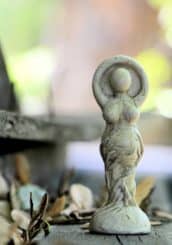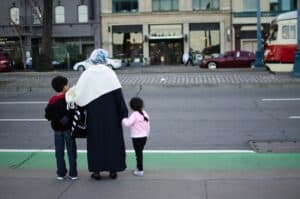
When I learned I was pregnant, I was scared
because I was the shape of the moon
and I didn’t think that my body carried enough light
to make the night sky shine.
Whittling a daughter from your flesh
feels like pulling the last hope out of your own body
and putting it into someone else.
You pray that it will grow taller
and taller like the sunflowers who thrust their faces toward the sun.
Birth is not the hardest thing I have done.
My body has been opened to reveal something sacred
more times than I can count.
I hear you call me in the mornings and the evenings, your cries
enlightening and louder than the pain I’m afraid I gave you.
Sometimes I think of your eyes and am filled with deep joy
because they shined with wonder and belief
before the world filled you up with grief, hatred, and doubt; you smiled
and curled into me because you were used to being safe beneath my heart.
Daughter, there will be days that you feel forgotten but do not
allow the seeds planted in you and in me to never get to see your light.
When your head droops, like the sunflowers at night, remember it is
only this season.
Turns out your skin is made up of water
and sometimes the most natural thing to do
is cry.
Turns out your skin is made up of water
and sometimes the most natural thing to do
is cry.
And I will collect your tears and throw them into the night sky as stars,
so that your petals, those fragile and determined limbs of yours
will believe
in something greater, like the wide blue of the ocean that
is merely a reflection of the truth inside of you.
The day you left my arms, I somehow felt forever broken and full.
The rainbow ahead of me, may it be the prisms of light, refining
the dark chasms you will tread but are to never dwell in.
May the mighty flood pushed out of me give a promise
that is renewed every time your eyes
open.
Katelyn Durst is a community artist, creative activist, teacher and youth worker. She has worked within urban youth development and urban community development for ten years and has taught poetry for six years, recently conducting poetry therapy workshops at a youth psychiatric hospital, and for Freedom Schools summer programming in a workshop focused on healing from the unjust deaths of youth of color. Katelyn is currently pursuing a master’s in Urban Studies and Community Arts from Eastern University with a focus on trauma-informed art-making to build sustainable and transformative resiliency within urban/inner-city and displaced communities. In her spare time, she dreams of becoming an urban beekeeper. She was poet-in-residence at The Mudroom, where this poem first appeared.


